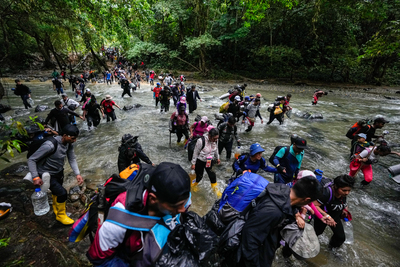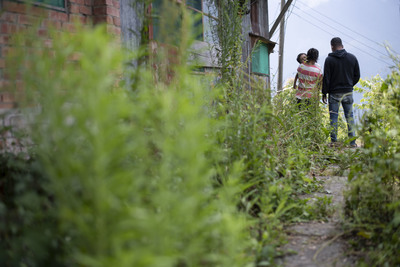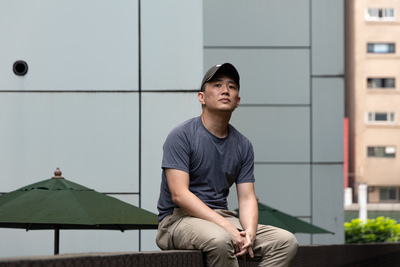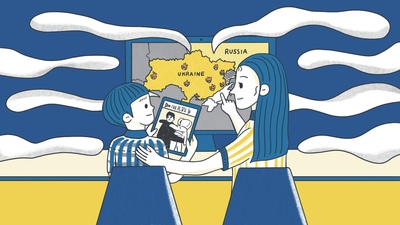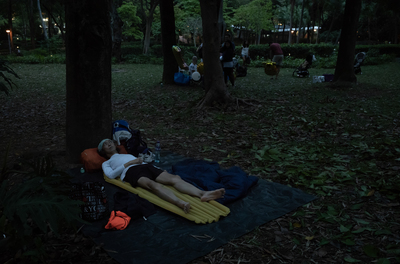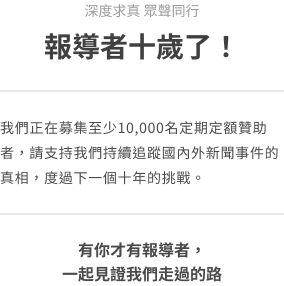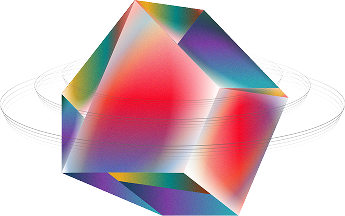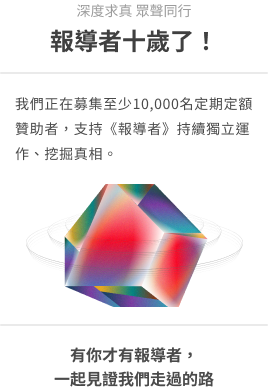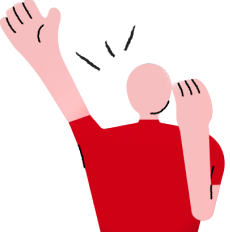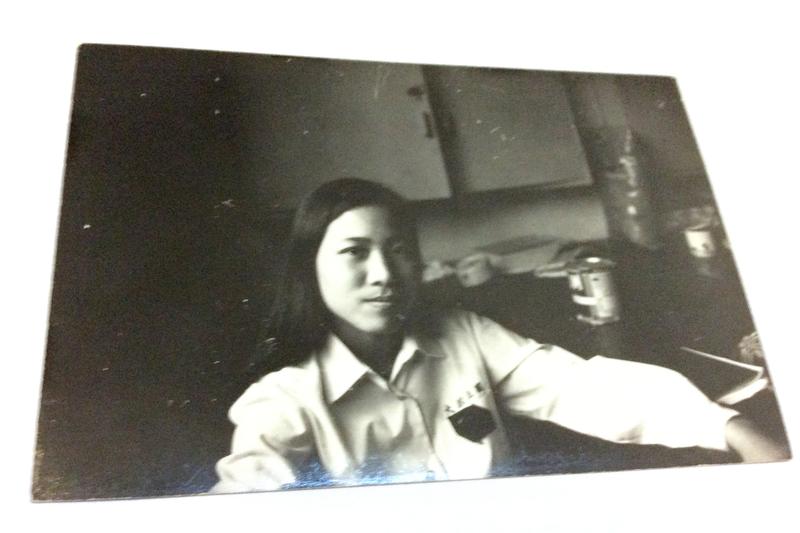
Only with the courage to remember, can we undergo self-reflection. But to remember martial law can be difficult. One of the reasons must be its muddled nature, since martial law erects limits on how we sense with our eyes, ears, mouths, noses, hands and feet.
This is a picture of me in mourning, the only one in my life. I’m not mourning a family member in the photo, but sitting in my college dormitory at age nineteen, during the second semester of my second year of college.
The memory I associate with this photo is that of a snaking line in front of Sun Yat-sen Memorial Hall, with people standing like props in a stage play. Every university department (maybe it was every class) waited their turn to go into the memorial hall to pay their respects to the remains of Chiang Kai-shek.
But I didn’t see anything, not even a coffin, just walls of people walking orderly in circles. I only saw the yellow roof of the memorial hall from far away. I didn’t even step onto the portico.
I have another memory from that day on April 5th. It was a very sunny day and there was a sudden thunderstorm; the sky darkened so quickly, as if the sky and the earth cried together. It was like a sign from the heavens! Could this mean that a great man had passed away?
October is a month filled with important holidays. There’s National Day, Retrocession Day, and Chiang Kai-Shek Memorial Day.
In the third year of middle school, I had to take part in an event that happens every October — the inter-school poetry recitation competition. But there was only one kind of poem read that day, and if it didn't start with “Honorable Chiang! You are the savior of our people, and the teacher of the revolution,” then it certainly ended with “You are the light of democracy, the helmsman of our era”; or maybe it was the other way around. In those days, radio stations would always broadcast these sorts of words with a dramatic cadence, and the winners of the recitation competition would have to go to the station for a recording.
With Chiang Kai-shek’s passing, these kinds of ceremonies came to an end too.
Up until my college days, The Central Daily News (中央日報) was always the biggest newspaper. The Central Daily News tower stood in front of Taipei Main Station, and people would often use it as a meeting point. But during my graduate school days, my reading habits slowly changed, and I started reading the pro-democracy China Times (中國時報) instead.
In 1978, the China Times reported much more frequently on the central government's plan to add more seats to the National Assembly and the new generation of tangwai figures having a go at politics. What’s more, none of these fresh faces seemed as frightening as they were made out to be. Although some of their arguments weren't fully formed, their emergence meant there was a chance that some kind of truth could emerge in politics.
On December 16, 1978, the United States broke off formal relations with the Republic of China, and all electoral activities ceased. There were far more reports about the suspended elections and controls on freedom of speech from the China Times than from any other.
Meanwhile, the establishment of both the pro-democracy Formosa Magazine (美麗島雜誌社) and the pro-establishment Storm Magazine (疾風雜誌社) seemed more like a contrast of ideas and viewpoints, rather than a battle between traitors and patriots.
One year later on International Human Rights Day, staff from Formosa Magazine held a human rights demonstration in Kaohsiung. Although media reported back and forth about whether they received police permission to hold the event, it was really nothing more than a political march.
The following day, the China Times reported that the military riot control unit was indeed present, and that there were clashes with the crowd leading to multiple arrests, but that it was still no more than an impassioned social movement flaring up.
But then on the third day, the China Times reverse-coursed. The participants in the march were now armed thugs, and its leaders were guilty of armed rebellion. The entire front page of the newspaper seemed to suddenly turn black, as if to make clear who was right and who was wrong.
At the time, I was in the final stretch of writing my masters’ thesis, but I couldn't concentrate at all. Every day before I started writing, I'd read news reports that I couldn't completely believe.
It wasn’t until the military began their investigation that the front pages began to slowly brighten. During the military investigation, the China Times published complete oral testimonies, which brought me to tears. I finished my masters' thesis weeping over these events.
At the end of 1980, the elections for the National Assembly resumed, and I cast my first vote. Even though I voted for these so-called "armed rebels” who were now thrown in prison, I harboured some resentment doing so. I thought, how could they be so careless? It would be a shame if this newly constructed bridge to liberalization and democracy collapsed like this half-way.
I brought that bit of resentment with me during my studies abroad. By the time I completed my studies and was ready to return home, talk of lifting martial law was already common in the market place of ideas. One time during my first month of teaching, my department head sent someone from a military radio station to interview me, and the first question they asked was: Should we end the prohibition on non-KMT political parties? I didn’t have an answer prepared, so I said:
The KMT always says they lost power on the mainland because there were too many small political parties, but the KMT also admits that the reason they lost then was because of rampant corruption. Is the contemporary KMT the same as the KMT that governed China? Being in Taiwan for so many decades, have they still not progressed? Doesn’t the KMT think that it practiced good governance, that it built Taiwan well? In that case what do they have to fear from small parties? If the KMT is really confident in their political achievements in Taiwan, then they don't need to be so fearful, there’s no need to scare themselves in this way.
That’s right, even before martial law was lifted, I could only say what I really thought, even when I stood before my students. This has nothing to do with carelessness, and everything to do with one’s conscience. What your conscience says is right must be said aloud, and you need to step up and fight against what your conscience says is wrong. The resentment I held towards this “careless” activists seemed childish now.
One year later, on July 15, 1987, martial law was lifted. But those shackles of thirty-eight years and two months still left self-imposed shackles.
It's already been three decades since the lifting of martial law, and our bounded eyes, ears, mouth, nose, hands and feet still seem as if they’re trapped in mud. It’s because of these bonds that we hobble slowly along the path to transitional justice.
(To read the Chinese version of this article, please click:【戒嚴生活記憶】許玉秀/解嚴了,然後呢?)
深度求真 眾聲同行
獨立的精神,是自由思想的條件。獨立的媒體,才能守護公共領域,讓自由的討論和真相浮現。
在艱困的媒體環境,《報導者》堅持以非營利組織的模式投入公共領域的調查與深度報導。我們透過讀者的贊助支持來營運,不仰賴商業廣告置入,在獨立自主的前提下,穿梭在各項重要公共議題中。
今年是《報導者》成立十週年,請支持我們持續追蹤國內外新聞事件的真相,度過下一個十年的挑戰。

